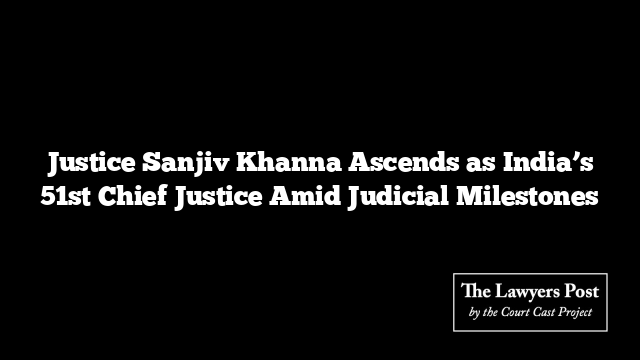The Indian judiciary embarked on a pivotal chapter in November 2024, marked by the appointment of Justice Sanjiv Khanna as the 51st Chief Justice of India and significant developments in the Supreme Court and High Courts.
Supreme Court Highlights
Justice Sanjiv Khanna, the seniormost judge of the Supreme Court, took the oath of office as Chief Justice of India (CJI) on November 11, 2024. The ceremony at Rashtrapati Bhavan, presided over by President Droupadi Murmu, celebrated Justice Khanna’s elevation. His tenure, succeeding Justice D.Y. Chandrachud, is set to last until May 13, 2025.
The Supreme Court Collegium, now led by Justice Khanna alongside Justices B.R. Gavai and Surya Kant, recommended two key appointments:
- Justice D. Krishnakumar as Chief Justice of the Manipur High Court, succeeding Justice Siddharth Mridul.
- Justice Manmohan, Chief Justice of the Delhi High Court, as a Supreme Court judge, filling one of the two vacancies in the apex court’s sanctioned strength of 34.
The month also witnessed the retirement of Justice Chandrachud on November 10, 2024, concluding his impactful tenure as the 50th CJI.
High Court Updates
The High Court of Jammu & Kashmir and Ladakh saw its sanctioned bench strength rise from 17 to 25 judges, reflecting a broader increase in the nationwide tally of High Court judges to 1,122. Notable retirements included Justice Siddharth Mridul, who concluded his tenure as Chief Justice of the Manipur High Court after 13 months of service.
In Memoriam
November also brought the loss of Justice Kuldip Singh, revered as “The Green Judge” for his monumental contributions to environmental law. Justice Singh’s legacy, shaped by landmark decisions that fortified India’s environmental jurisprudence, continues to inspire the judiciary.
These milestones underscore the dynamic evolution of India’s judicial framework, as it adapts to address contemporary challenges while honoring its storied legacy.





